Nabór 2024
Sajad Akbari Moghaddam Sani
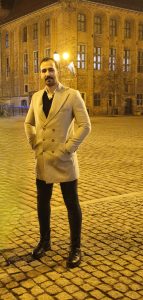 My name is Sajad Akbari Moghaddam Sani, and I am a PhD student at the Doctoral School of Exact and Natural Sciences, Department of Meteorology and Climatology. My PhD project, titled “Reconstruction of Extreme Cold and Warm Weather and Climate Events in Poland from the 11th to the 18th Century in the Light of Documentary Evidence,” is focused on analyzing the occurrences and characteristics of extreme weather and climate events in Poland over several centuries.
My name is Sajad Akbari Moghaddam Sani, and I am a PhD student at the Doctoral School of Exact and Natural Sciences, Department of Meteorology and Climatology. My PhD project, titled “Reconstruction of Extreme Cold and Warm Weather and Climate Events in Poland from the 11th to the 18th Century in the Light of Documentary Evidence,” is focused on analyzing the occurrences and characteristics of extreme weather and climate events in Poland over several centuries.
My research aims to reconstruct historical extreme thermal events, such as severe frost, cold and warm waves, and cold and warm winters and summers, in order to assess their natural variability, temporal repeatability, and long-term tendencies. This project will provide valuable insight into how climate events in the past compare to modern-day occurrences, especially in the context of global warming.
As an international student, studying in Poland has been an enriching and eye-opening experience. The opportunity to work under the supervision of Prof. Dr. hab. Rajmund Przybylak has allowed me to gain valuable insights into my field and broaden my academic horizons. Poland, with its rich history, vibrant culture, and welcoming people, has been the perfect setting for both my academic and personal growth. I have thoroughly enjoyed the challenges and experiences that come with studying in a foreign country, and I am excited to continue contributing to the field of climatology and meteorology.
Paweł Binkowski
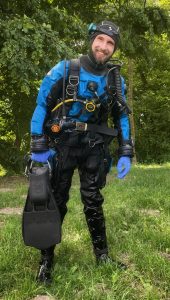 Jestem doktorantem w Szkole Doktorskiej Nauk Ścisłych i Przyrodniczych „Academia Scientarium Thoruniensis” gdzie realizuję projekt pod tytułem „Modern electrochemical energy storage devices”.
Jestem doktorantem w Szkole Doktorskiej Nauk Ścisłych i Przyrodniczych „Academia Scientarium Thoruniensis” gdzie realizuję projekt pod tytułem „Modern electrochemical energy storage devices”.
Ukończyłem studia I jak i II stopnia na kierunku chemia medyczna (UMK w Toruniu). W trakcie studiów zajmowałem się syntezą i modyfikacją węglowych nanomateriałów oraz ich badaniem pod kątem zastosowania w elektrochemii jak i medycynie, co stało się inspiracją do rozpoczęcia studiów doktorskich.
Projekt doktorski, którego realizacji podjąłem się polega na wytwarzaniu i badaniu nowych materiałów elektrodowych mających wykorzystywać nanomateriały w magazynach elektrochemicznych. Otrzymane materiały będą badane zarówno przy wykorzystaniu odpowiednich badań materiałowych jak i technik elektroanalitycznych, ale również w eksperymentalnych ogniwach.
W czasie wolnym lubię ogrywać gry komputerowe z gatunku city builder`ów, RTS`ów, symulatorów oraz RPG. Po rozpoczęciu studiów zostałem płetwonurkiem OWD z kilkoma specjalizacjami, jestem również w trakcie zdobywania kolejnych certyfikatów w tym kierunku. Z bardziej przyziemnych rzeczy uwielbiam wytwarzać różnorodne nalewki, przetwory domowe oraz gotować dania z kuchni Polskiej, Włoskiej, Japońskiej oraz Amerykańskiej.
Agnieszka Gołembiewska
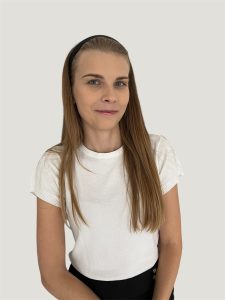 Od 1 października 2024 roku jest doktorantką w Szkole Doktorskiej Nauk Ścisłych i Przyrodniczych „Academia Scientarium Thoruniensis”, gdzie realizuje projekt „Periodic solutions of symmetric Hamiltonian systems” pod opieką prof. dr. hab. Sławomira Rybickiego i dr Anny Gołębiewskiej (Wydział Matematyki i Informatyki Uniwersytetu Mikołaja Kopernika w Toruniu).
Od 1 października 2024 roku jest doktorantką w Szkole Doktorskiej Nauk Ścisłych i Przyrodniczych „Academia Scientarium Thoruniensis”, gdzie realizuje projekt „Periodic solutions of symmetric Hamiltonian systems” pod opieką prof. dr. hab. Sławomira Rybickiego i dr Anny Gołębiewskiej (Wydział Matematyki i Informatyki Uniwersytetu Mikołaja Kopernika w Toruniu).
Tytuł magistra matematyki zdobyła w czerwcu 2024 roku, broniąc pracę „Kontinua niestacjonarnych rozwiązań okresowych układu hamiltonowskiego inspirowanego kosmologią” pod opieką prof. dr. hab. Sławomira Rybickiego na Wydziale Matematyki i Informatyki Uniwersytetu Mikołaja Kopernika w Toruniu. Natomiast w 2022 roku zdobyła tytuł licencjata z matematyki na Wydziale Matematyki i Informatyki Uniwersytetu Mikołaja Kopernika w Toruniu oraz tytuł licencjata z ekonomii na Wydziale Nauk Ekonomicznych i Zarządzania Uniwersytetu Mikołaja Kopernika w Toruniu.
Prywatnie uwielbia polskie morze i długie spacery. Próbuje odkrywać i poznawać świat, podróżując.
Garima Kalra
 I am Dr. Garima Kalra, a dedicated veterinarian hailing from Rajasthan, India, with a strong academic and research foundation in veterinary and animal sciences. I earned my Bachelor of Veterinary Science and Animal Husbandry (BVSc & AH) from Rajasthan University of Veterinary and Animal Sciences, Bikaner, which laid the groundwork for my passion in both clinical veterinary practice and research.
I am Dr. Garima Kalra, a dedicated veterinarian hailing from Rajasthan, India, with a strong academic and research foundation in veterinary and animal sciences. I earned my Bachelor of Veterinary Science and Animal Husbandry (BVSc & AH) from Rajasthan University of Veterinary and Animal Sciences, Bikaner, which laid the groundwork for my passion in both clinical veterinary practice and research.
Motivated by a desire to explore the scientific underpinnings of animal health, I pursued a master’s degree (MVSc) in Animal Genetics and Breeding from Guru Angad Dev Veterinary and Animal Sciences University (GADVASU), Punjab—one of India’s leading institutions in veterinary research. During my postgraduate studies, I developed a keen interest in molecular biology and genetic tools, particularly in their application to improve livestock productivity and health.
To broaden my practical skills and deepen my understanding of the subject, I underwent intensive hands-on training at the National Research Centre on Pig in Assam, India. There, I gained valuable experience in applying molecular techniques in livestock research. I also hold a Diploma in Animal Welfare from Indira Gandhi National Open University, New Delhi, which has further enhanced my perspective on ethical and sustainable animal care practices.
My commitment to research excellence is reflected in my participation in international workshops, including the “International Workshop on Genome Editing in Food Security and Environmental Sustainability,” sponsored by McGill University (Canada), the University of Saskatchewan (Canada), and GADVASU. Additionally, I received specialized training in “Molecular Diagnostic Techniques for Foodborne and Zoonotic Diseases,” organized by the Indian Council of Agricultural Research (ICAR), India.
Currently, I am pursuing a PhD at Nicolaus Copernicus University in Poland. My doctoral research focuses on transcriptome analysis of the liver to evaluate the therapeutic potential of Silybum marianum (milk thistle) herb extract in preventing liver dysfunction, using pigs as an animal model. This project aligns closely with my long-standing interest in hepatic health, functional genomics, and the multi-omics approach to understanding complex biological systems. Hepatic diseases continue to pose a major challenge in both animal and human medicine, and I am eager to contribute to advancements in this field through evidence-based research.
Beyond my academic and professional endeavours, I am passionate about food blogging and enjoy sharing culinary experiences on social media. I also find joy in music, particularly playing the synthesizer, and staying active through sports like table tennis and billiards.
With a blend of scientific curiosity, practical experience, and a global perspective, I am committed to contributing meaningfully to the field of veterinary science and fostering innovation in animal health research at Nicolaus Copernicus University and beyond.
Adam Konysz
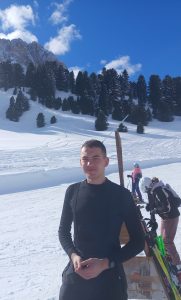 W 2024r. Ukończyłem studia magisterskie na kierunku matematyka na Uniwersytecie Mikołaja Kopernika w Toruniu, broniąc pracę magisterską pt. „Stany półklasyczne dla równania z operatorem curl-curl”.
W 2024r. Ukończyłem studia magisterskie na kierunku matematyka na Uniwersytecie Mikołaja Kopernika w Toruniu, broniąc pracę magisterską pt. „Stany półklasyczne dla równania z operatorem curl-curl”.
Obecnie realizuję projekt doktorski „Variational, topological and geometrical methods in applications to partial differential equations”. Jak nazwa projektu wskazuje moje zainteresowania naukowe skupiają się wokół zastosowań metod rachunku wariacyjnego do równań różniczkowych cząstkowych.
W wolnym czasie uprawiam biegi długodystansowe. Lubię także wyjazdy w góry, zwłaszcza na narty, oraz wieczory spędzone przy dobrej książce.
Łukasz Kotlewski
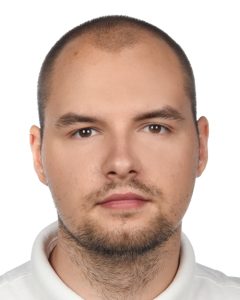
Ukończył studia II stopnia na kierunku matematyka w specjalności teoretycznej z wynikiem bardzo dobrym. Pracę magisterską pt. „Miary konforemne dla przekładań odcinków” napisał pod opieką dr. Przemysława Berka i obronił na ocenę bardzo dobrą. W trakcie studiów był wykonawcą w projekcie NCN OPUS-23 pt. „Potoki translacyjne na powierzchniach i ich zastosowania do problemów w układach dynamicznych” kierowanym przez prof. dr. hab. Krzysztofa Frączka. Był laureatem Stypendium JM Rektora dla najlepszych studentów oraz na rok akademicki 2022/2023
otrzymał Stypendium Ministra za znaczące osiągnięcia.
Podczas studiów z sukcesami brał udział w międzynarodowych zawodach matematycznych, zdobywając liczne medale i wyróżnienia. W ostatnim roku akademickim m.in. zdobył w części indywidualnej złoty medal na ISTCiM w Katowicach. Dodatkowo, brał udział w konferencjach naukowych oraz był aktywnym członkiem Koła Naukowego Matematyków WMiI UMK.
Jego zainteresowania naukowe oscylują wokół układów dynamicznych i teorii ergodycznej. Obecnie kontynuuje badania kształcąc się w Szkole Doktorskiej Nauk Ścisłych i Przyrodniczych „Academia Scientarium Thoruniensis”, gdzie realizuje projekt pt.„Perturbacje potoków lokalnie hamiltonowskich oraz uogólnione przekładania odcinków” pod opieką prof. dr. hab. Krzysztofa Frączka.
Agnieszka Kowaluk
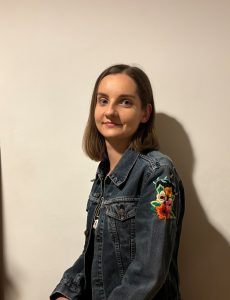 I graduated MSc degree in chemical technology at Warsaw University of Technology. As a part of my engineering and master’s thesis, I was involved in the study of electrolytes for lithium-ion cells. Currently, I’m working at the Central Office of Measures in Warsaw as a metrologist. The main assignment of a metrologist is maintenance and development of national and reference mesurement standards. My duties includes calibration of equipment for the correct performance of measurements.
I graduated MSc degree in chemical technology at Warsaw University of Technology. As a part of my engineering and master’s thesis, I was involved in the study of electrolytes for lithium-ion cells. Currently, I’m working at the Central Office of Measures in Warsaw as a metrologist. The main assignment of a metrologist is maintenance and development of national and reference mesurement standards. My duties includes calibration of equipment for the correct performance of measurements.
At the Doctoral School of Natural Sciences, I am pursuing the project, “Innovative multi-parameter reference materials as metrological tools for quality control of selected elements and nutrients in confectionery products.” The studies take place as part of the implementation doctorate under the supervision of Prof. Dr. Aleksandra Szydlowska-Czerniak.
I like to spend my free time creatively. I’m learning to sew on the sewing machine, I’m involved in clothing alteration and embroidery. I especially like the floral ornaments.
Karolina Ostrowska
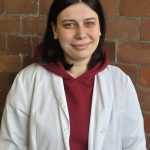 Studia magisterskie ukończyłam na Wydziale Chemii Uniwersytetu Mikołaja Kopernika w Toruniu, aktualnie jestem doktorantką w Szkole Doktorskiej Nauk Ścisłych i Przyrodniczych „Academia Scientiarum Thoruniensis”.
Studia magisterskie ukończyłam na Wydziale Chemii Uniwersytetu Mikołaja Kopernika w Toruniu, aktualnie jestem doktorantką w Szkole Doktorskiej Nauk Ścisłych i Przyrodniczych „Academia Scientiarum Thoruniensis”.
W pracy badawczej zajmuję się syntezą nowych adsorbentów oraz opracowaniem metod analitycznych, które będą wykorzystywane do ekstrakcji oraz analizy chromatograficznej nusinsersenu (oligonukleotyd antysensowy) i jego metabolitów. Jest to substancja czynna leku Spinraza, który jest jednym z trzech leków stosowanych obecnie w terapii rdzeniowego zaniku mięśni (SMA). Łączę aspekty teoretyczne z praktycznymi, dążąc do tworzenia rozwiązań wspierających monitorowanie efektów terapeutycznych u dzieci poddanych leczeniu. Opracowane przeze mnie procedury analityczne wykorzystam do analizy nusinersenu i jego metabolitów w próbkach osocza i płynu mózgowo-rdzeniowego.
Nihal Purohit
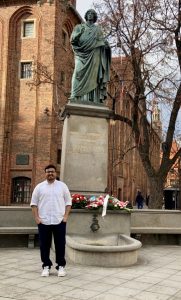
I am Nihal Purohit, a PhD student from Nagpur, India. Specializing in transcriptome analysis of the liver under supervision of Professor Dr. Chandra Pareek at Interdisciplinary Center for Modern Technologies of the Nicolaus Copernicus University in Torun. I hold a master’s degree in Pharmaceutical Sciences from Nagpur University, India, and have two years of experience in preclinical research at in Life Sciences.
My current research focuses on the impact of Curcuma longa (CL) herb extract supplementation in preventing liver dysfunction. Utilizing a pig model, I aim to uncover molecular pathways and mechanisms through detailed RNA sequencing and bioinformatics analysis. This work seeks to advance our understanding of herbal medicine’s role in liver health.
In addition to my research, I have hands-on experience as a study scientist and quality control personnel in preclinical trials. I am well-versed in Good Laboratory Practices (GLP), ensuring rigorous scientific protocols and quality standards in experimental design, data collection, and analysis. My work bridges advanced molecular biology techniques with practical applications, contributing to the field of liver health and disease prevention.
I am passionate about advancing pharmaceutical sciences and look forward to making meaningful contributions in my research endeavors.
Beyond academics, I am passionate about sharing knowledge and mentoring aspiring students in the field of pharmaceutical sciences. I have participated in workshops and seminars aimed at educating undergraduates about the importance of research in advancing healthcare solutions. Engaging with the academic community fuels my passion for discovery and reinforces my commitment to making a meaningful impact.
In conclusion, my multifaceted background in pharmaceutical sciences, practical research experience, and dedication to understanding liver health position me as an emerging researcher in the field. I am excited about the future of my work and the potential it holds for advancing our understanding of herbal medicine and its role in disease prevention. I look forward to contributing to the vibrant research community at Nicolaus Copernicus University and collaborating with others who share a commitment to excellence in science and healthcare.
Mateusz Suwiński
 Mateusz Suwiński is conducting research in the discipline of Earth and related environmental sciences. Professor Piotr Weckwerth is supervising his doctoral research. The PhD thesis, entitled “Multiple glacial lake-outburst floods in north-eastern Poland and their contribution to the development of the Biebrza-Narew ice-marginal valley during the last glaciation”, focuses on reconstructing past glacial flood events and their impact on landscape formation.
Mateusz Suwiński is conducting research in the discipline of Earth and related environmental sciences. Professor Piotr Weckwerth is supervising his doctoral research. The PhD thesis, entitled “Multiple glacial lake-outburst floods in north-eastern Poland and their contribution to the development of the Biebrza-Narew ice-marginal valley during the last glaciation”, focuses on reconstructing past glacial flood events and their impact on landscape formation.
Prior to commencing his PhD, Mateusz successfully completed a BSc in Geography and an MSc in Environmental Geoinformation. He has experience of working on research projects, including participation as a contractor in the OPUS grant of the National Science Centre (2018/31/B/ST10/00976) titled “Geomorphic records and palaeogeographic implications of Late Weichselian glacial megafloods and surges at the southern sector of the Scandinavian ice sheet (MEASSIS).” He is also a co-author of two scientific articles. Additionally, Mateusz has actively presented his findings at numerous conferences related to geography, GIS, geomorphology and sedimentology, giving both oral and poster presentations.
Beyond his research, Mateusz is deeply involved in academic and student activities. He is an active member of the Student Scientific Association of Geographers NCU, serving as its President (2023-2024) and Vice-President (2024-2025). His contributions to organising workshops, scientific festivals and conferences have been recognised twice with awards from the NCU Rector’s Office.
Outside of his professional commitments, Mateusz’s personal interests include gaming, with a particular passion for open-world RPGs, strategy games, action-adventure titles, and simulators. His current dream is to visit every National Park in Poland.
ORCID: https://orcid.org/0009-0008-0338-2506
ResearchGate: https://www.researchgate.net/profile/Mateusz-Suwinski
Miłosz Wasicki
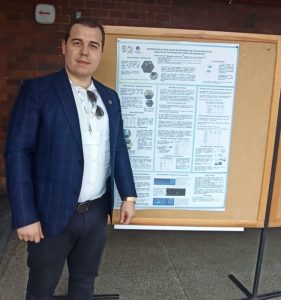 Jestem absolwentem Uniwersytetu Mikołaja Kopernika w Toruniu. Ukończyłem studia na kierunku biotechnologia. W ramach pracy licencjackiej zajmowałem się między innymi analizą potencjału mikropropagacji gatunków z rodziny Asteraceae, a następnie podczas pracy magisterskiej analizą i dystrybucją sekwencji mikrosatelitarnych w genomie jednego z halofitów Tripolium pannonicum. Wyniki moich badań prezentowałem w trakcie wielu konferencji krajowych i międzynarodowych.
Jestem absolwentem Uniwersytetu Mikołaja Kopernika w Toruniu. Ukończyłem studia na kierunku biotechnologia. W ramach pracy licencjackiej zajmowałem się między innymi analizą potencjału mikropropagacji gatunków z rodziny Asteraceae, a następnie podczas pracy magisterskiej analizą i dystrybucją sekwencji mikrosatelitarnych w genomie jednego z halofitów Tripolium pannonicum. Wyniki moich badań prezentowałem w trakcie wielu konferencji krajowych i międzynarodowych.
Biorę czynny udział w prowadzeniu warsztatów i wykładów, w tym w ramach Nocy Biologów czy Fascynującego Dnia Roślin. Łącząc naukową pasję z turystyką stałem się także autorem pracy w dziedzinie fitoterapii, gdzie zająłem się szczegółowym opisem roślinnych substancji biologicznie aktywnych obecnych w lekach i suplementach z potencjałem dietetycznym czy leczniczym.
Aktualnie jako członek CD IDUB ToPerMed „W kierunku medycyny spersonalizowanej” (grupa BioSep) realizuję interdyscyplinarny projekt doktorski w Szkole Doktorskiej Nauk Ścisłych i Przyrodniczych „Academia Scientarium Thoruniensis” pt. „Nowe podejście w analizie związków niskocząsteczkowych w paszach objętościowych przy wykorzystaniu technik elektrochemicznych, rozdzielczych i spektralnych” pod kierunkiem Promotor – dr hab. Małgorzaty Szultka-Młyńskiej, prof. UMK oraz Promotor Pomocniczej – dr Agnieszki Ludwiczak. W ramach projektu współpracuje z Interdyscyplinarnym Centrum Nowoczesnych Technologii oraz Katedrą Chemii Środowiska i Bioanalityki UMK w Toruniu.
Posiadam doświadczenie zawodowe między innymi w sektorze agrotechnicznym. Obsługując klientów prywatnych i komercyjnych zajmowałem się sprzedażą i doradztwem w kwestii wyboru biopreparatów mikrobiologicznych z przeznaczeniem zastosowania w stymulacji wydajnej produkcji roślinnej gatunków uprawnych, efektywnego użycia inokulantów w produkcji wysokokalorycznych pasz, sterylizacji pomieszczeń inwentarskich, a także efektywnego zwalczania mykotoksyczości u zwierząt gospodarczych.
Agata Wikarska
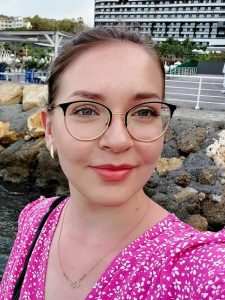 Pracę magisterską pt. „Puryny i inne neuroprzekaźniki jako czynniki troficzne regulujące proces neurogenezy” realizowałam w Katedrze Biochemii na Wydziale Nauk Biologicznych i Weterynaryjnych pod opieką dr Joanny Czarneckiej. W tejże katedrze obroniłam na ocenę bardzo dobrą także pracę licencjacką pt. „Biochemia zaburzeń nastroju”, nagrodzoną dodatkowo I miejscem w wydziałowym konkursie prac dyplomowych.
Pracę magisterską pt. „Puryny i inne neuroprzekaźniki jako czynniki troficzne regulujące proces neurogenezy” realizowałam w Katedrze Biochemii na Wydziale Nauk Biologicznych i Weterynaryjnych pod opieką dr Joanny Czarneckiej. W tejże katedrze obroniłam na ocenę bardzo dobrą także pracę licencjacką pt. „Biochemia zaburzeń nastroju”, nagrodzoną dodatkowo I miejscem w wydziałowym konkursie prac dyplomowych.
Byłam studentką aktywną naukowo, realizowałam trzy projekty naukowe w ramach Grants4NCUStudents, pełniąc rolę zarówno kierownika, jak i uczestnika. Swoje wyniki prezentowałam na konferencjach, m.in. podczas ogólnopolskiej konferencji „Nano(&)BioMateriały – od teorii do aplikacji”. Jestem także autorką publikacji naukowej pt. „Mesenchymal Stem Cells and Purinergic Signaling in Autism Spectrum Disorder: Bridging the Gap between Cell-Based Strategies and Neuro-Immune Modulation”. W toku studiów zostałam trzykrotnie nagrodzona Stypendium Rektora dla najlepszych studentów, a także zostałam uhonorowana tytułem „Student na 5+ – Wzór studenta” podczas V Gali Copernicana.
Ponadto, przez dwa lata pełniłam funkcję wiceprzewodniczącej Studenckiego Koła Naukowego Biotechnologów „Biotechnologia thoruniensis”. Udzielałam się w licznych wydarzeniach wydziałowych, jak i uniwersyteckich, m.in. podczas Nocy Biologów, Toruńskiego Festiwalu Nauki i Sztuki oraz wydziałowych i uniwersyteckich Dni Otwartych. Brałam udział w projekcie
popularnonaukowym „Koło jeździ wkoło”, promującym wiedzę biotechnologiczną wśród społeczności województwa kujawsko-pomorskiego. Miałam także okazję prowadzić zajęcia w ramach Uniwersytetu Dziecięcego, pełnić rolę starosty roku oraz Elektora w Kolegium Elektorskim Uniwersytetu Mikołaja Kopernika w Toruniu.
Obecnie realizuję pracę doktorską pt. „Role of purinergic signaling in the processes of regeneration, repair and remodeling with endothelial cells” w Szkole Doktorskiej Nauk Ścisłych i Przyrodniczych „Academia Scientarium Thoruniensis”, pod kierunkiem prof. Katarzyny Roszek.

 ul. W. Bojarskiego 1, 87-100 Toruń
ul. W. Bojarskiego 1, 87-100 Toruń